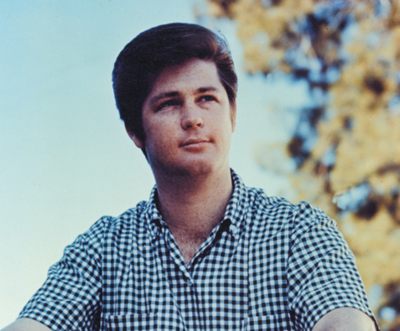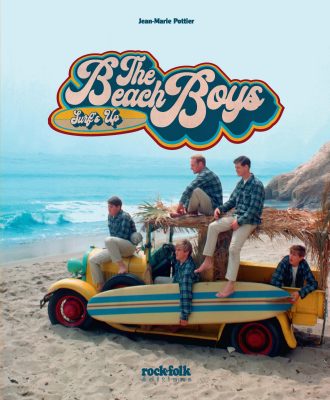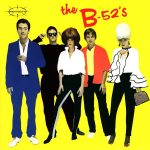Brian Wilson’s achievement was in capturing the untutored brilliance of his sonic imagination on record, writes John Cavanagh
Support independent, non-corporate media.
Donate here!

“Poetic, beautiful even in its obscurity, ‘Surf’s Up’ is… a symbol of the change many of these young musicians see in our future.” By the time an American tv audience saw Brian Wilson play this extraordinary song at the piano and hear that description in a 1967 documentary co-authored by Leonard Bernstein and David Oppenheim, Wilson’s confidence in his projected meisterwerk Smile had crumbled. Publicity surrounding Brian’s “genius” raised fear in him that the public would not take kindly to his new ideas. When Smile was performed live at the Royal Festival Hall in 2004, Brian Wilson received a ten minute standing ovation, saying it was “scary”. When asked what he meant, the composer said “good-scary”.
The duality of love and fear was one of the main driving forces in the life of this unique artist who died on 11th June at 82. His relationship with dominating/abusive father Murry Wilson is well documented elsewhere. It’s summed up acutely by Gary Usher’s recollection of co-writing In My Room with Brian at his family home. This poignant turning point in Brian’s songwriting was almost stymied by the demand that Usher leave, as he had overstayed Murry Wilson’s imposed house curfew time.
Significant advances in Brian’s ability to realise his sonic imagination included ejecting Murry from studio sessions and ceasing live performance with the Beach Boys. Although Brian already held a highly unusual position in producing Beach Boys records when most bands were barely even invited to listen to playbacks, his great discovery came in working with LA’s top session players who could realise the sounds he heard in his head.
Brian’s role model was Phil Spector, seen as the auteur producer of the time, his darker personal character notwithstanding. Spector certainly had broad-ranging gifts. However, in one aspect, Brian was even more of an all-rounder. For the “Wall of Sound” to function, Phil needed an arranger and the sound that’s instantly recognisable as Spector’s trademark has a lot to do with his choice in that role: Jack Nitzsche.
Brian knew what he wanted and the studio became his instrument to get it on tape. The calibre of musicians he chose – many of them Spector session regulars – was key to this.
Bassist/guitarist Carol Kaye told me: “He wrote the music! He would bring in the parts, maybe the notes would be on the wrong side of the stem with flats and sharps all over the place, but he wrote that music and we sat and read it”, adding “It’s a good thing he wasn’t trained in music, because he broke all the rules in writing what he did”.

Brian’s textures included instruments that weren’t heard elsewhere in fashionable circles. The accordion would’ve been considered “square” in the ’60s, synonymous with ultra-un-hip American bandleader Lawrence Welk, but listen to Wouldn’t It Be Nice and imagine it without Carl Fortina and Frank Marocco’s accordion lines: here’s the essence of Brian Wilson’s aural imagination. It’s there too in the use of bass harmonica, mando-guitar and, famously, that oscillating sound on Good Vibrations.
Brian heard the Theremin as an eight year old. “It really frightened me a lot”, he said, but recalled it when he wanted something to go with cellos playing in triplets on his new song. Finding someone to play the hands-free instrument wasn’t so easy. Session trombonist Paul Tanner had the answer with his own Electro-Theremin, played with a sliding control.
“Brian had such definite bass ideas”, says Carol Kaye, insisting that her picked bass part opening Good Vibrations was Wilson’s line, note for note. Yet for all his creative thinking, Brian was open-minded too.
Another musician who played on many Brian Wilson sessions was drummer Hal Blaine. He recalled: “We were all drinking orange pop in bottles back then. I turned a bunch of the orange bottles upside down and started tapping them with the tips of my sticks. God Only Knows was up, and I saw Brian in the control room running around with that frantic “roll the tape” look. My playing the bottles is that galloping sound percolating under the keyboards. It enters the tune with the lead vocal”.
With these musicians, Brian Wilson brought new possibilities to what “pop” could be and left many “what if” thoughts to follow. Carol Kaye mused: “I’m really surprised Brian didn’t take arranging lessons and wind up scoring movies like Quincy Jones did because he could have done it… maybe he didn’t have the self-confidence to learn the nuts and bolts of writing music”.
That Brian was able to tour and perform his Smile album in later life is a glorious coda to the story, and he continued to record. Shorn of all pop production, Brian’s melodies now air on classical music radio stations. I’m sure Leonard Bernstein would approve; I hope Brian would feel the new source of love for his art, maybe even above “good-scary”.









